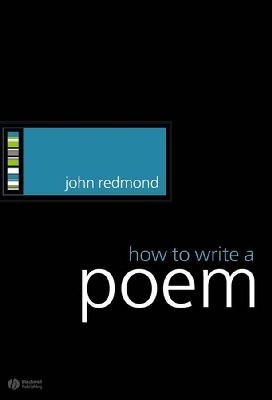
Stock image for illustration purposes only - book cover, edition or condition may vary.
How to Write a Poem
John Redmond
€ 34.56
FREE Delivery in Ireland
Description for How to Write a Poem
Paperback. * An innovative introduction to writing poetry designed for students of creative writing and budding poets alike. * Challenges the reader's sense of what is possible in a poem. * Traces the history and highlights the potential of poetry. Series: How to Study Literature. Num Pages: 168 pages, 0. BIC Classification: CFG; DSC. Category: (P) Professional & Vocational. Dimension: 229 x 153 x 10. Weight in Grams: 248.
An innovative introduction to writing poetry designed for students of creative writing and budding poets alike.
An innovative introduction to writing poetry designed for students of creative writing and budding poets alike.
- Challenges the reader’s sense of what is possible in a poem.
- Traces the history and highlights the potential of poetry.
- Focuses on the fundamental principles of poetic construction, such as: Who is speaking? Who are they speaking to? Why does their speaking take this form?
- Considers both experimental and mainstream approaches to contemporary poetry.
- Consists of fourteen chapters, making it suitable for use over one semester.
- Encourages readers to experiment with their poetry.
Product Details
Publisher
John Wiley and Sons Ltd United Kingdom
Number of pages
168
Format
Paperback
Publication date
2005
Series
How to Study Literature
Condition
New
Number of Pages
176
Place of Publication
Hoboken, United Kingdom
ISBN
9781405124805
SKU
V9781405124805
Shipping Time
Usually ships in 7 to 11 working days
Ref
99-50
About John Redmond
John Redmond is the author of one collection of poems, Thumb’s Width (2001), which was longlisted for the Guardian First Book Award, and he features as one of ‘The New Irish Poets’ in a Bloodaxe anthology of that name. He was previously Assistant Editor of the long-running poetry magazine Thumbscrew, and writes reviews on a regular basis for the London ... Read more
Reviews for How to Write a Poem
"John Redmond's "How to Write a Poem" contains no false notes. He does not patronise his reader with easy examples or workshop games, but lights on his subject with elegant pragmatism and humility. His overall argument arises from a very personal yet wholly professional sense of poetry as an art form in practice, and his examples are informed by deep ... Read more
